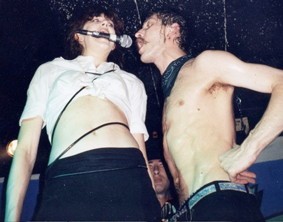A ragtag gang of European immigrants
Rock doc lacks a message but is hard to ignore nonetheless
From Gogol Bordello’s humble beginnings in an underground Bulgarian bar in New York, to appearances on Late Night with Conan O’Brien and collaborations with Manu Chao, Margarita Jimeno chronicles the rise of Eugene Hutz’s brainchild, step by filthy step.
Big Smash! Productions is screening the film this Friday, Oct. 3 as a lead-up to Gogol Bordello’s performance at the Burton Cummings Theatre the next day.
Gogol Bordello, a group that’s arguably best known in North America as the founders of gypsy punk, is comprised of a ragtag gang of European immigrants, whose diversity is suitably paralleled in their theatrical costumes and colourful stage performances.
Frontman Hutz, a self-proclaimed “cultural refugee,” carries this documentary with easy charm and linguistic gift, spouting quotable passages referencing his journey from Communist Ukraine during the Soviet collapse, to the fulfillment of his own personal American Dream.
Teenage Eugene bounded from underground bar to bar mitzvah, picking up an assortment of multi-ethnic musicians and their respective styles in his wake.
The viewer is transported with the band and their punk antics on a tour of North America following the release of their first album Voi-La Intruder. They are subsequently banned from local pub after dingy bar.
Their destructive on-stage tomfoolery, however, is noted as being the catalyst for underground attention from bored punk rockers looking for something new.
The band’s rise from obscurity climaxes in the film as a headlining collaboration at the Manu Chao Festival.
Since this documentary was made, the band has played alongside musical greats like Madonna and Kings of Leon, and, as the aptly-titled documentary suggests, they show no signs of stopping.
The highlight of Jimeno’s doc comes in the spliced-in concert footage between band interviews, during which the viewer is subject to the sensory overload that is a Gogol Bordello performance.
Hutz’s seemingly endless amount of energy propels the band and audience into a frenzy, evoking images of a Ukrainian Johnny Rotten.
The band’s redefinition of crowd surfing, a trademark of their live performances, has one back-up dancer surfing across the audience standing on a drum.
Jimeno encapsulates the energy of the band in a fitting style of somewhat grainy handheld cameras; but at no point does this compromise the visual stimulation.
However, at times she adds elements to the film that seem questionable, specifically on Hutz’s daily errands to the shoe repair store and the sandwich shop.
This film doesn’t tackle any enormous current issues and the band gets along with little conflict. The documentary may be lacking an overall message, but the band’s mantra is tough to ignore: “Think globally, fuck locally.”
Published in Volume 64, Number 5 of The Uniter (October 1, 2009)







